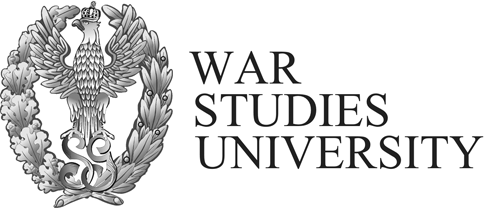Online first
Current issue
All issues
About
Aims and scope
Peer review process
Publication policy and ethics & malpractice statement
Editorial Board
Reviewers
Publisher
Guide for authors
Call for papers
Book Reviews
Special Issues Archive
New and emerging technologies in defence education, training and governance
Multidimensional Challenges for National and International Security in the Context of Hybrid Warfare
Guest editors: Antonia Colibasanu, Marta Gębska, Marlena Zadorożna
The Russian Federation’s full-scale military aggression against Ukraine has changed the architecture of international security, and has also served as a reminder of how serious a threat hybrid actions are to state and international security. Cyberattacks, information warfare, instrumentalisation of migratory movements, fuelling anti-refugee sentiment and acts of sabotage targeting the critical infrastructure of NATO and EU states are just examples of the broad spectrum of Russian activity.
Hybrid activities not only expose Western states to further dangers, but can also destabilise their functioning. Their multidimensionality provokes an in-depth debate on new challenges to national and international security. The term hybrid threat, in turn, refers to an action taken by states and non-state actors with the aim of destabilising or harming the target of attack through the combined use of overt and covert means, both military and non-military.
Unprecedented hybrid attacks are constantly being experienced by, for example, Poland, Lithuania and Latvia, repelling aggressive disinformation activities and provocations against officers and soldiers involved in stopping illegal border crossing attempts organised by the Belarusian regime with the support and approval of the Kremlin. The cynical hybrid operation is part of Russia's long-term and hostile strategy against the West. This has been accompanied by another wave of economic shocks on global markets. Economic sanctions, energy and food crises, inflation in many countries, unstable financial markets, currency fluctuations, are all creating new challenges that have a direct impact on the contemporary security environment. In public discourse, more and more attention is being paid not only to the necessary crisis mitigation measures, but also to maintaining unity in allied and community structures.
This Special Issue calls for contributions that analyse and assess the challenges and threats emerging at various levels of security in the context of hybrid warfare, in the military, political, economic, cyber, information, environmental and social areas, as well as papers aimed at making forecasts in these areas.
The topics relevant to this Special Issue include, but are not limited to:
1) Definitions and theoretical assumptions of hybrid warfare
2) Military security in the context of hybrid warfare
3) Political security in the context of hybrid warfare
4) Economic security in the context of hybrid warfare
5) Cyber security in the context of hybrid warfare
6) Information security in the context of hybrid warfare
7) Environmental security in the context of hybrid warfare
8) Societal security in the context of hybrid warfare
9) State, regional and global security in the context of hybrid warfare
10) Ways to counter hybrid threats
11) Projected directions of changes in the balance of power in Europe after the end of the war in Ukraine
12) Scenarios for the development of the situation in Ukraine – implications for the security of Poland
13) The evolution of security strategies of European states after the outbreak of war in Ukraine
14) Security policy of European states in an era of hybrid threats
15) Hybrid activities of the Russian Federation against the sovereignty of Ukraine since 1991
Manuscript submission
Manuscripts should be no longer than 5000 to 8000 words, including abstract, references, and tables; they should be formatted and submitted per standard policies and procedures of the
Security & Defence Quarterly: https://securityanddefence.pl/. Once you have accessed the SDQ website, click on the ‘Submit your paper’ button, log in, then select Multidimensional Challenges for National and International Security in the Context of Hybrid Warfare Special Issue. All submissions are subject to standard peer review, revision, and re-submission processes. Please direct any queries to Dr. Joanna Przybylak at j.przybylak@pracownik.akademia.mil.pl
Deadline for submissions of full articles: October 31, 2023
Special Edition’s Guest Editorial Team:
Antonia Colibasanu, Ph. D., National University of Political Science and Administration, Geopolitical Futures
Marta Gębska, Ph.D., War Studies University, Poland
Marlena Zadorożna, Ph.D., War Studies University, Poland
Published papers: Volume 46 Issue 2, 2024
The Russian Federation’s full-scale military aggression against Ukraine has changed the architecture of international security, and has also served as a reminder of how serious a threat hybrid actions are to state and international security. Cyberattacks, information warfare, instrumentalisation of migratory movements, fuelling anti-refugee sentiment and acts of sabotage targeting the critical infrastructure of NATO and EU states are just examples of the broad spectrum of Russian activity.
Hybrid activities not only expose Western states to further dangers, but can also destabilise their functioning. Their multidimensionality provokes an in-depth debate on new challenges to national and international security. The term hybrid threat, in turn, refers to an action taken by states and non-state actors with the aim of destabilising or harming the target of attack through the combined use of overt and covert means, both military and non-military.
Unprecedented hybrid attacks are constantly being experienced by, for example, Poland, Lithuania and Latvia, repelling aggressive disinformation activities and provocations against officers and soldiers involved in stopping illegal border crossing attempts organised by the Belarusian regime with the support and approval of the Kremlin. The cynical hybrid operation is part of Russia's long-term and hostile strategy against the West. This has been accompanied by another wave of economic shocks on global markets. Economic sanctions, energy and food crises, inflation in many countries, unstable financial markets, currency fluctuations, are all creating new challenges that have a direct impact on the contemporary security environment. In public discourse, more and more attention is being paid not only to the necessary crisis mitigation measures, but also to maintaining unity in allied and community structures.
This Special Issue calls for contributions that analyse and assess the challenges and threats emerging at various levels of security in the context of hybrid warfare, in the military, political, economic, cyber, information, environmental and social areas, as well as papers aimed at making forecasts in these areas.
The topics relevant to this Special Issue include, but are not limited to:
1) Definitions and theoretical assumptions of hybrid warfare
2) Military security in the context of hybrid warfare
3) Political security in the context of hybrid warfare
4) Economic security in the context of hybrid warfare
5) Cyber security in the context of hybrid warfare
6) Information security in the context of hybrid warfare
7) Environmental security in the context of hybrid warfare
8) Societal security in the context of hybrid warfare
9) State, regional and global security in the context of hybrid warfare
10) Ways to counter hybrid threats
11) Projected directions of changes in the balance of power in Europe after the end of the war in Ukraine
12) Scenarios for the development of the situation in Ukraine – implications for the security of Poland
13) The evolution of security strategies of European states after the outbreak of war in Ukraine
14) Security policy of European states in an era of hybrid threats
15) Hybrid activities of the Russian Federation against the sovereignty of Ukraine since 1991
Manuscript submission
Manuscripts should be no longer than 5000 to 8000 words, including abstract, references, and tables; they should be formatted and submitted per standard policies and procedures of the
Security & Defence Quarterly: https://securityanddefence.pl/. Once you have accessed the SDQ website, click on the ‘Submit your paper’ button, log in, then select Multidimensional Challenges for National and International Security in the Context of Hybrid Warfare Special Issue. All submissions are subject to standard peer review, revision, and re-submission processes. Please direct any queries to Dr. Joanna Przybylak at j.przybylak@pracownik.akademia.mil.pl
Deadline for submissions of full articles: October 31, 2023
Special Edition’s Guest Editorial Team:
Antonia Colibasanu, Ph. D., National University of Political Science and Administration, Geopolitical Futures
Marta Gębska, Ph.D., War Studies University, Poland
Marlena Zadorożna, Ph.D., War Studies University, Poland
Published papers: Volume 46 Issue 2, 2024
We process personal data collected when visiting the website. The function of obtaining information about users and their behavior is carried out by voluntarily entered information in forms and saving cookies in end devices. Data, including cookies, are used to provide services, improve the user experience and to analyze the traffic in accordance with the Privacy policy. Data are also collected and processed by Google Analytics tool (more).
You can change cookies settings in your browser. Restricted use of cookies in the browser configuration may affect some functionalities of the website.
You can change cookies settings in your browser. Restricted use of cookies in the browser configuration may affect some functionalities of the website.




